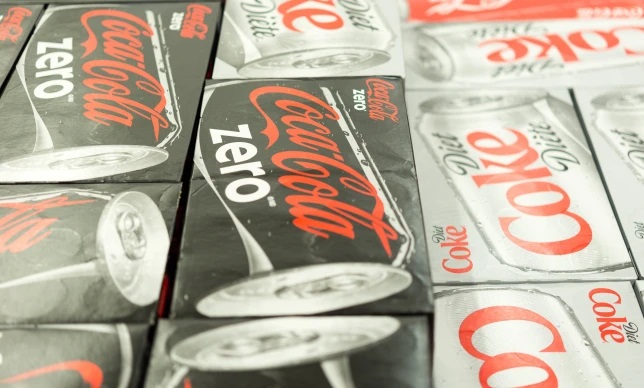The World Health Organisation (WHO) is set to declare an artificial sweetener as a possible cause of cancer.
Aspartame is used in popular products like Coca-Cola’s diet drinks and Mars Extra chewing gum.
But next month, the WHO is set to list it as ‘possibly carcinogenic to humans’, according to two sources with knowledge of the process.
The ruling won’t take into account how much aspartame someone can consume safely – that advice comes separately from a WHO expert committee on food additives.
The organisation’s committee on additives is reviewing aspartame use this year, and will announce its findings on July 14, the same day the decision on whether to declare it as carcinogenic is published.
A spokesman for the International Agency for Research on Cancer (IARC), the WHO’s dedicated cancer research arm which has been looking into the sweetener, said its findings were ‘confidential’ until July.
The additives committee ‘conducts risk assessment, which determines the probability of a specific type of harm to occur under certain conditions and levels of exposure’.
Since 1981,the additives committee has said aspartame is safe to consume within daily limits.


For example, an adult weighing 60 kg (132 pounds) would have to drink between 12 and 36 cans of diet soda – depending on the amount of aspartame in the beverage – every day to be at risk.
This view has been widely shared by national regulators, including in the United States and Europe.
The IARC’s rulings can have a huge impact – but have also sparked criticism over warnings about hard-to-avoid substances and situations.
It previously classed working overnight and eating red meat as ‘probably cancer-causing’, and using mobile phones as ‘possibly cancer-causing’.
The International Sweeteners Association has criticised the IARC’s decision-making, saying: ‘IARC is not a food safety body and their review of aspartame is not scientifically comprehensive and is based heavily on widely discredited research.’
The International Council of Beverages Associations’ executive director Kate Loatman said public health authorities should be ‘deeply concerned’ by the ‘leaked opinion’, and also warned it ‘could needlessly mislead consumers into consuming more sugar rather than choosing safe no- and low-sugar options’.
Sources close to the IARC say classing aspartame as a possible carcinogen should motivate more research into the sweetener.
Last month the WHO advised people not to use non-sugar sweeteners while attempting to lose weight, causing uproar in the food industry.
Latest Stories
-
Cedi confidence and the cost of complacency: What the BoG Governor’s speech reveals
13 minutes -
Ga Mantse pledges support for Onesta Ghana’s Palm Oil expansion drive
23 minutes -
Today’s Front pages: Wednesday, July 16, 2025
48 minutes -
Government committed to honouring sacrifices of veterans – Defence Minister
2 hours -
Mahama’s fuel ban could deliver 81 maternity clinics, 121 schools and 303 CHPS compounds – Dr Khalid
2 hours -
Fuel allowance scrapped: Gov’t, on average, will save over GH¢121m in 4 years – Dr Sharif Khalid
2 hours -
Veterans deserve better – Defence Minister Omane Boamah calls for national support
2 hours -
Trump launches probe into Brazil’s ‘unfair’ trade practices
3 hours -
US inflation rises as tariffs drive up prices
3 hours -
Yemen postpones execution of Indian nurse on death row
3 hours -
World’s ‘oldest’ marathon runner dies at 114 in hit-and-run
3 hours -
Nigeria bids farewell to former leader Buhari with burial in home state
3 hours -
London Mayor leads historic trade mission to Ghana and Africa to deepen investment and cultural ties
4 hours -
Drug possession: Court refuses trader bail for the second time
4 hours -
Study finds high levels of arsenic, mercury in Keta Lagoon, triggers public health alarm
4 hours

